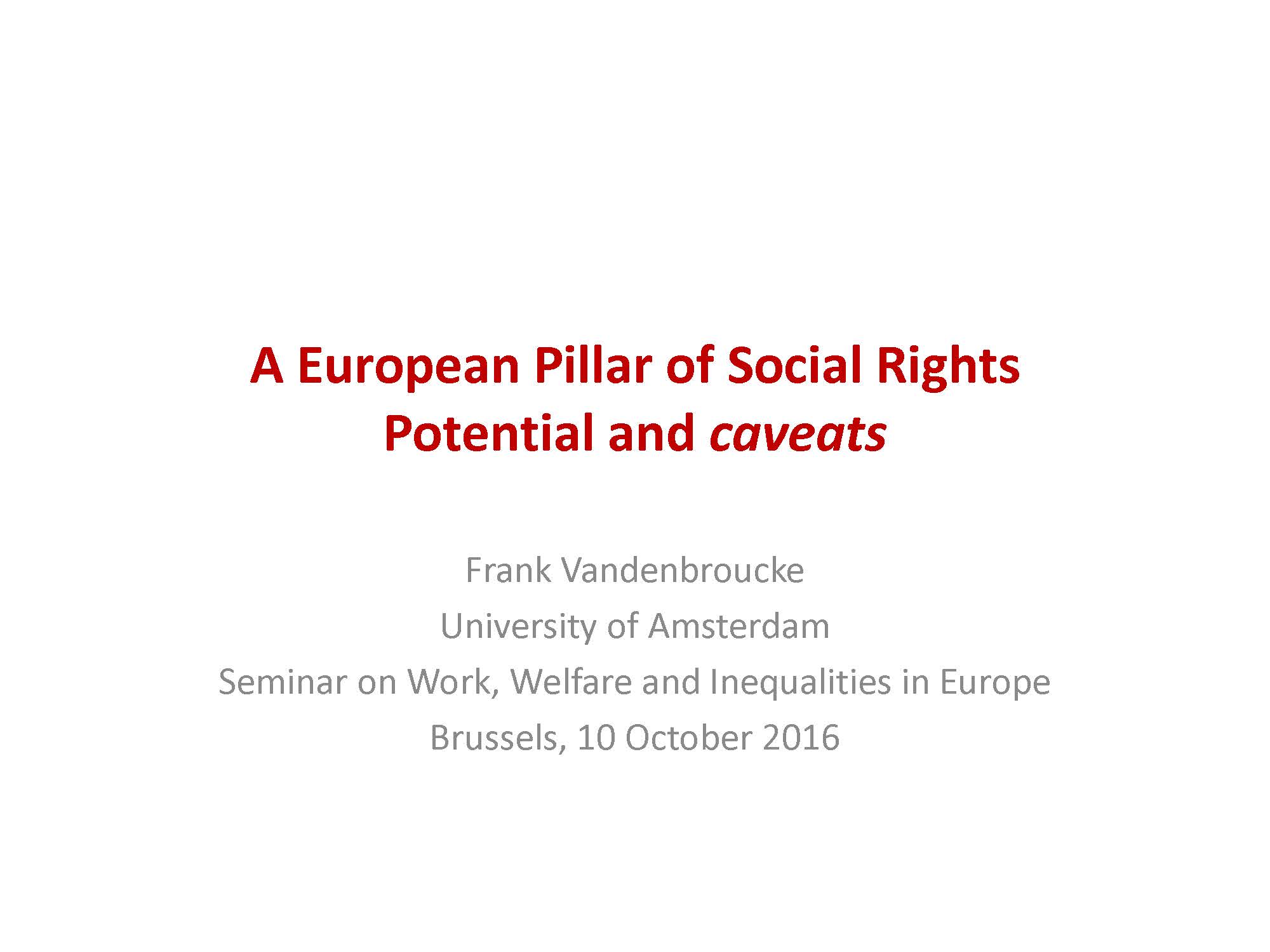 Download presentation
Download presentation
Pillar_Social_Rights_Seminar_Work-Welfare-Inequalities_10.10.2016_Vandenbroucke
A European Pillar of Social Rights
Potential and caveats
Frank Vandenbroucke
University of Amsterdam
Seminar on Work, Welfare and Inequalities in Europe
Brussels, 10 October 2016
A basic consensus on the social objectives of EMU/EU is a
necessity…
• … for the EU to be a union of well-functioning welfare states
(social & economic stabilization; upward convergence)
• Arguments related to EMU
• Arguments related to EU28 (now 27)
• A European Pillar of Social Rights: potential & caveats
Social and economic stabilization: the contribution of transfers
(not pensions) in the reduction of poverty
0
5
10
15
20
25
30
2004-06 2012
Inadequate welfare states
Austerity & problem of stabilization Erosion of mature welfare states ?
Source: Eurostat, own calculation of ‘poverty reduction by transfers (excl. pensions)’, total population, SILC
2005-2007 en SILC 2013
A basic consensus on the social objectives of EMU is a necessity
• The problem of stabilization => any ‘Eurozone re-insurance’ of national
stabilization policies presupposes (a) minimum requirements w.r.t. the
adequacy of national unemployment insurance and the concomitant
labour market regulation; and (b) general trust in the quality of each
other’s social fabric.
• More generally, EMU forces upon the member states :
– a shared conception of labour market flexibility (and , hence, security)
– symmetric guidelines on wage cost competitiveness (e.g. ‘golden rule’ linking
wages to productivity) & institutions that can deliver (importance of coordinated
collective bargaining)
– long term: sustainability of pensions
• The need for conceptual clarity: a European Social Union ≠ a European
Welfare State
Arguments related to EU28 (now 27)
• An inevitability of European Monetary Union;
• Upward convergence across the EMU/EU28 requires a combination
of social investment, sufficiently egalitarian background conditions
and social protection
• Freedom of movement and national social cohesion in EU: a
‘balancing act’ is possible, based on sound and consistent principles
– Non-discrimination of mobile workers / delineated role for posting
– ‘Social dumping’ related to mobility: also depends on domestic labour
market regulation
– Economic freedoms right to strike (Viking, Laval)European
A European Pillar of Social Rights: arguments
• A basic consensus about the general features of the ‘social
order’ that is associated with the Monetary Union is a
necessity; the EPSR can contribute to such a consensus.
• Upward convergence across the EMU/EU28 requires a
combination of social investment, sufficiently egalitarian
background conditions and social protection, as embodied in
the EPSR.
• Cross-border mobility must be embedded in employment
relations of sufficient quality: a role for EPSR
A European Pillar of Social Rights: caveats
• The expression ‘rights’ creates expectations
• If the perception is that the EPSR is a ‘replay’ of earlier initiatives based on soft coordination,
the initiative will frustrate expectations and backlash
• There is a need both for social benchmarking and for a legislative agenda; two relationships
are to be clarified:
– The relation between the EPSR and the new social benchmarking initiative announced by the
Commission in its Work Programme 2016 and its Communication of 21.10.2015 on the follow-up of
the Five Presidents’ Report
– The relation between the EPSR and the legal acquis in domains in which the EU has legislative
competences
• A link is needed with the ‘hard’ agenda on the completion of EMU, notably the case for a
Eurozone stabilization capacity (cf. supra, ‘re-insurance’ and minimum requirements)
• The EPSR should be discussed and consolidated at the highest political level (cf. the political
salience of the Fiscal Compact)
Resources
1) Vandenbroucke, Automatic stabilizers for the Euro area and the European Social Model, Tribune,
Notre Europe Institut Jacques Delors, 22 September 2016
(http://www.institutdelors.eu/media/stabiliserssocialeurope-vandenbroucke-jdisept16.pdf?pdf=ok)
2) Vandenbroucke and Rinaldi, Social inequalities in Europe – The challenge of convergence and
cohesion. In: Vision Europe Summit Consortium (eds.): Redesigning European welfare states – Ways
forward, Gütersloh (http://www.vision-europe-summit.eu/)
3) Vandenbroucke, The Case for a European Social Union. From Muddling through to a Sense of
Common Purpose, in Marin, B. (Ed.), The Future of Welfare in a Global Europe, Ashgate: Aldershot
UK, 2015, pp. 489-520.
4) Vandenbroucke, A European Social Union: Unduly Idealistic or Inevitable?, European Debates, 7,
European Investment Bank Institute, September 2015 (http://institute.eib.org/wpcontent/uploads/2015/09/A-European-Social-Union-Unduly-Idealistic-or-Inevitable.pdf)
5) Vandenbroucke, Sociaal beleid in een muntunie: puzzels, paradoxen en perspectieven, Inaugural
Lecture at the University of Amsterdam, 1 June 2016 www.frankvandenbroucke.uva.nl
www.frankvandenbroucke.uva.nl
